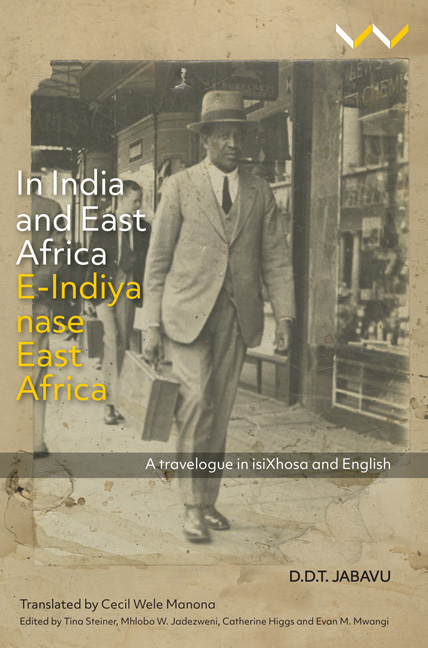Book contents
- Frontmatter
- Contents
- List of Illustrations
- Maps
- Acknowledgements
- Networks of Solidarity: D.D.T. Jabavu’s Voyage to India
- Revisiting D.D.T. Jabavu, 1885–1959
- Notes on the Original and the Translation
- In Praise of Cecil Wele Manona, 1937–2013
- E-Indiya nase East Africa
- In India and East Africa
- Afterword: Jabavu and African Translations for the Future
- References
- Editors’ Biographies
- Index
Networks of Solidarity: D.D.T. Jabavu’s Voyage to India
Published online by Cambridge University Press: 27 March 2020
- Frontmatter
- Contents
- List of Illustrations
- Maps
- Acknowledgements
- Networks of Solidarity: D.D.T. Jabavu’s Voyage to India
- Revisiting D.D.T. Jabavu, 1885–1959
- Notes on the Original and the Translation
- In Praise of Cecil Wele Manona, 1937–2013
- E-Indiya nase East Africa
- In India and East Africa
- Afterword: Jabavu and African Translations for the Future
- References
- Editors’ Biographies
- Index
Summary
Ukuhamba kukubona
— isiXhosa, ‘To travel is to see.’
On 5 November 1949, Davidson Don Tengo (D.D.T.) Jabavu, the prominent South African academic, Methodist lay preacher, politician and seasoned traveller, set out on a four-month-long trip to India to attend the World Pacifist Meeting in Santiniketan and Sevagram. Jabavu was not the first black South African to travel to India; however, he may have been the only one of his generation to publish his detailed observations as a travelogue afterwards. This little-known isiXhosa text, written in a conversational register in keeping with the conventions of the genre, provides a rare perspective on the mid-twentieth century transnational pacifist scene after Mahatma Gandhi's death, at the nexus of decolonisation and the Cold War. With its emphasis on observation and dialogue, the narrative speaks to the way in which the geographies of various emancipatory movements – the American civil rights movement, African liberation movements and the international radical peace movement – intersected in a space like Santiniketan. For Jabavu, the voyage to India, with its significant stopovers in East Africa, provided an opportunity to move within such diverse transnational geographies of resistance. The narrative contains wide-ranging reflections on the fauna and flora of the changing landscape, on intriguing social interactions during the trip and the conference, and on the way in which Gandhian principles (Ahimsa, ‘non-violence’, and Satyagraha, ‘soul force’) might yield lessons for his isiXhosa readership. The narrative thus provides fascinating insight into political and intellectual flows between India and Africa from an African perspective.
Parts of the travelogue, E-Indiya nase East Africa, appeared in the bilingual weekly Imvo Zabantsundu (African Opinion), which his father, the politician and newspaper editor John Tengo Jabavu, had founded in 1884 and edited until his death in 1921. From its inception, the paper functioned as an influential mouthpiece for the political aspirations of educated Africans in their quest for the expansion of the non-racial franchise of the Cape Colony and political rights premised on imperial citizenship, that is, on ‘British ideas about liberty, consensual governance, and the rule of law’.
- Type
- Chapter
- Information
- In India and East Africa / E-Indiya Nase East AfricaA Travelogue in isiXhosa and English, pp. 1 - 26Publisher: Wits University PressPrint publication year: 2019



